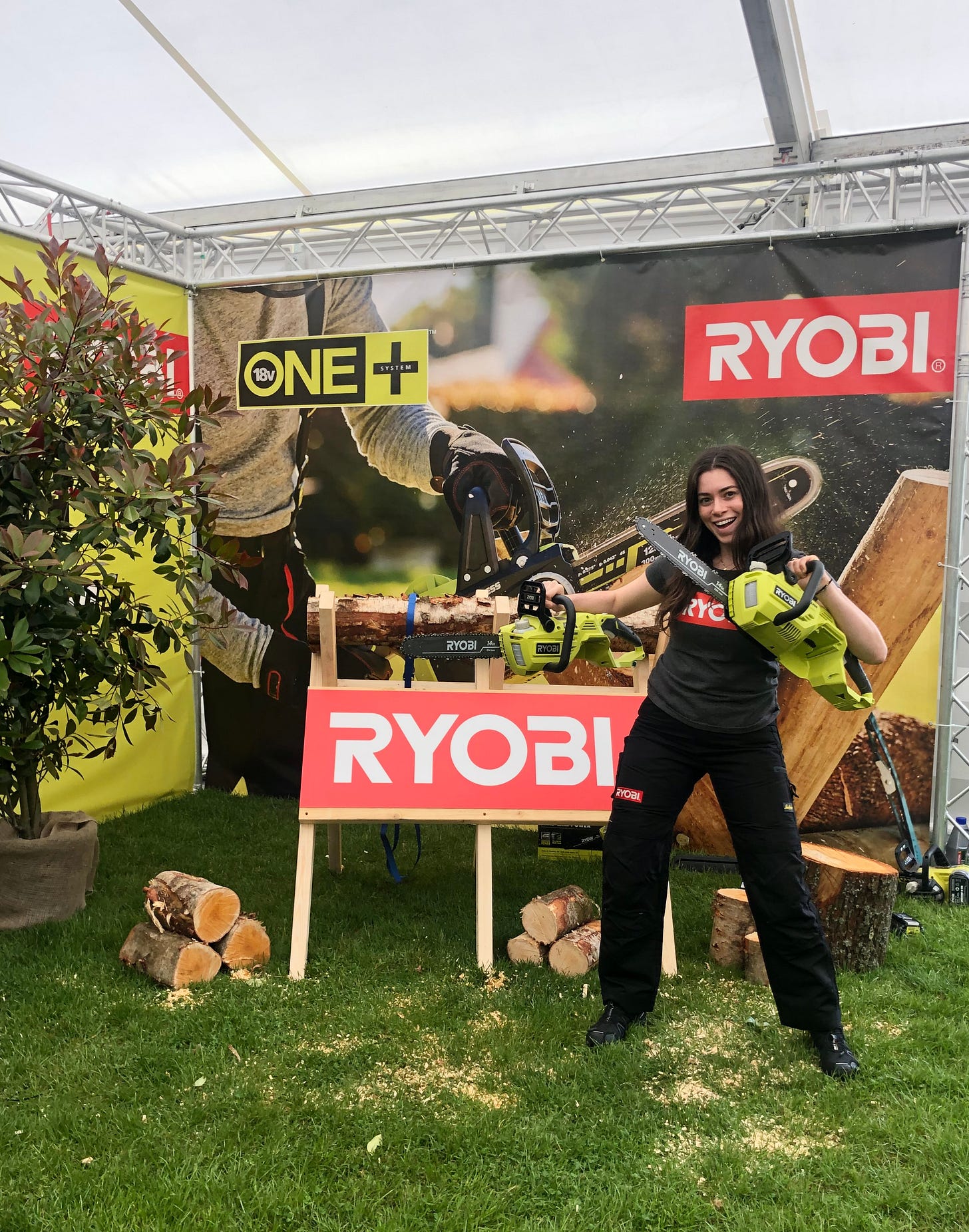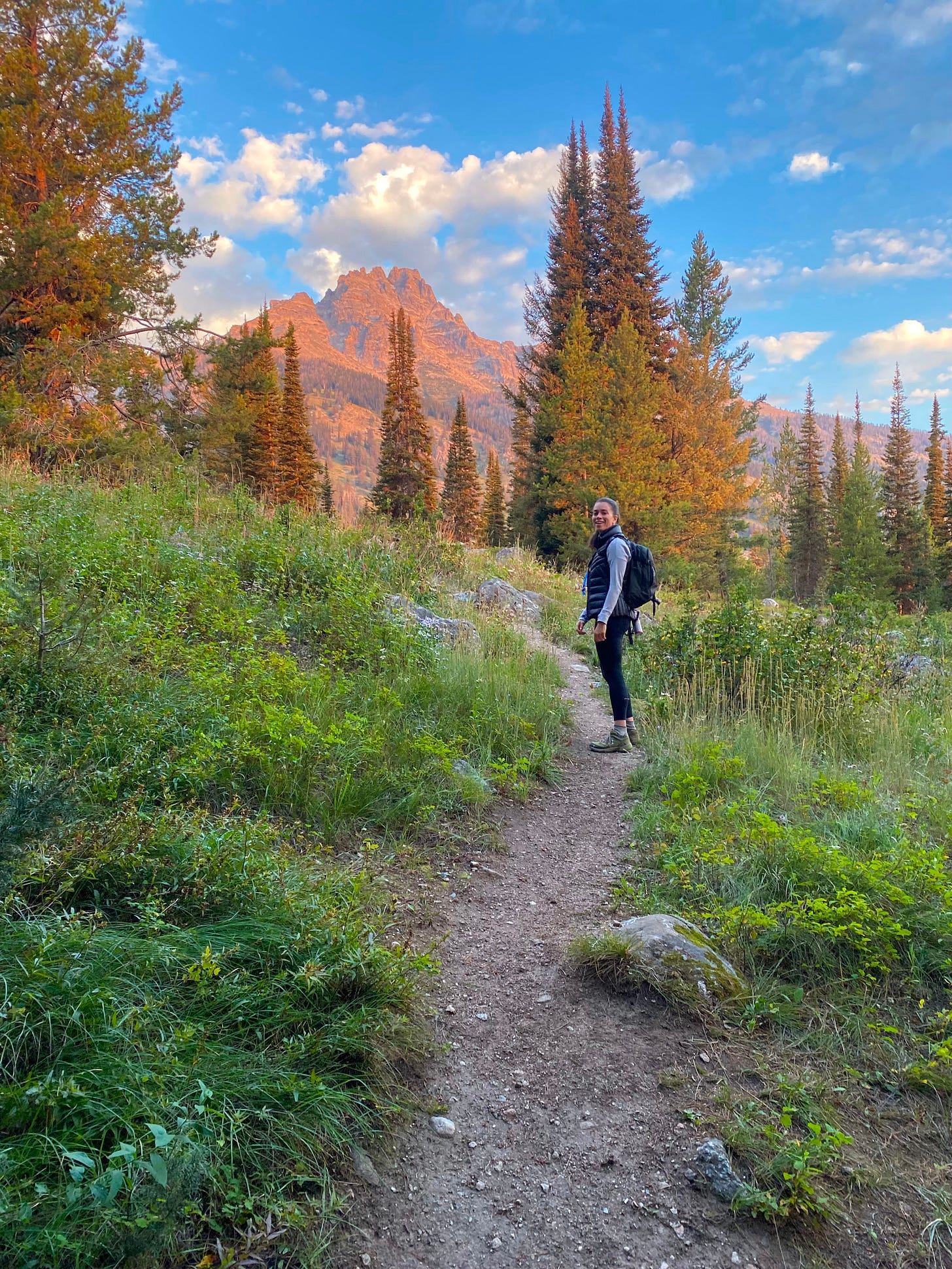At 21, fresh out of college, I spent my days designing lawn mowers, chainsaws, snow blowers, and power washers. Things that cut, things that shape, things that force nature into submission.
I'd sit on production lines in China, watching metal become machine. In South Africa, I'd photograph these tools before they hit shelves, shiny and full of potential. Around Europe, I’d watch our users craft green sanctuaries in their homes. There's something deeply satisfying about creating something physical, something that fits into the palm of a hand and helps people make their green spaces beautiful.
What no one tells you about building tools is that you can become one: precise, relentless, defined by function.
Given this was my first big girl job, I believed the only path forward was to go above and beyond every single task, to say yes until my tongue ached. That’s not an isolated experience, and in fact I think something most do in our early careers.
Perfectionism wasn't a personality trait; it was my entire personality. My ambition had no off switch, no safety guard, no emergency brake. I was obsessed with getting shit done and proud of myself that I could.
people love to tell you that you're too young to be burned out at 24.
"Just wait until you're older," as if exhaustion is a luxury good that appreciates with age.
But burnout doesn't check ID. My body started to protest in ways I couldn't ignore: hair falling out in clumps, sleep that never arrived, daily panic attacks in the office bathroom, trouble keeping food down.
The worst part wasn't the physical decay. It was the masking. I'd walk into meetings, crush presentations, and collect praise like trading cards. I was obsessed with doing great work (still am, tbh, I’ve just made some changes to how).
Inside, I was hollow. A perfect machine with failing parts. I never showed vulnerability at work, and worse, I didn't acknowledge it even to myself because the moment I admitted I wasn't healthy would be the moment I'd have to do something about it.
So I kept going, kept building, kept cutting. I was the chainsaw and the tree.
When the inevitable breaking point came, I did what every burnt-out twenty-something does: I switched jobs. Tech was sexy, tech was the future. I'd no longer build things you could hold, rather I'd build things you could see. Surely that would fix me.
As I learned 6 months later, burnout doesn't stay behind when you clean out your desk. It follows you, unpacks its bags, makes itself at home in new environments. The hair fall continued, the anxiety amplified, the body still betrayed.
I also really missed the tangible satisfaction of creating something I could hold. I’ll eventually write a post about misalignment and it’s path to burnout.
one call to change it all
My grandmother had been diagnosed with Alzheimer's two years prior. Her decline had been slow, measured in small forgettings: where she'd placed her glasses, what day it was, which grandchild was which in old photographs.
I called her, desperate for wisdom, for comfort, for any advice that might pull me back from the edge I was teetering on. I spilled my story in a flood of words, barely pausing for breath.
Her response: "Who is this?"
It’s mental that four syllables can shatter your world.
In that moment, the fragility of our health crystallised with heartbreaking clarity. I suddenly understood that I was the only guardian of my wellbeing, the only one who could pull the emergency brake on the runaway train of my ambition.
Health isn't something you sacrifice now and collect later like compound interest. It doesn't work that way. Your body keeps the score, and eventually, it presents the bill.
That night, I made decisions that felt both radical and obvious. I stopped drinking alcohol. I found a personal trainer. I mapped every person, place, and activity that made me feel alive, then scheduled them into my calendar like non-negotiable meetings with myself.
A lot of people approach burnout recovery like a gentle slope, a slow climb back to wellness. Mine was a cliff face. I needed to wake up one morning and be someone different than I'd been the day before. Not because the gentle approach is wrong, but because sometimes the only way out is through. All at once.
Within 9 months, I was me again.
the mountain that talked to me
Two years after my grandmother forgot my name, I found myself on a mountain in Wyoming at sunrise.
I'm not particularly religious, but there are moments when the universe speaks with such clarity that only the stubbornly deaf could ignore it. Standing there, watching dawn break over the valley, something broke open in me too.
(Above is an actual a photo of that exact moment, which seems cosmically funny. Who takes pictures of people having existential realisations? My husband, apparently.)
What I understood on that mountain was that careers aren't linear paths but seasons that change with us. Sometimes you need a heavy coat of structure, sometimes a light sweater of flexibility, sometimes just the freedom of bare skin in the sun.
I had been designing tools, but I hadn't been designing how I spent my time.
After that hike, I filled an entire notebook with ideas. Not business plans exactly, but seeds of things I might grow. What emerged was a pattern: I wanted to help people who stood where I had stood, hair falling out, panic rising, bodies betraying them through overwork and misalignment.
Now, instead of a job, I have projects. A little constellation of work that shifts and evolves as I do:
I coach people through burnout recovery, helping them find energy before they try to find answers. Asking "what's next in my career?" when you can barely get out of bed is like asking which marathon to run when you're on crutches.
I consult on products, especially with women who want to build things from a place of personal purpose rather than market pressure. We build things worth building.
I’m creating retreats where people hike mountains that become metaphors, answering one essential question with each ascent: what's truly holding you back and how might you decide to overcome it?
I'm exploring ideas on how to neutralise founder loneliness in Australia. I moved here in January 2025 and while going to the beach midday is incredible, I feel the emotional impact of being a floating ship out here with no community around me.
Some months these projects bring five figures. Other months, close to nothing. The financial instability would have terrified my 22-year-old self. Now I understand that the more I create from alignment rather than obligation, the more abundance tends to follow. Is it a perfect science? Absolutely not. I’ve had to learn to endure risk, and think I will forever be working that muscle. I like feeling like I can pay my rent.
My old way of working was dominated by urgency: everything a five-alarm fire, everything needing immediate attention. What burnout taught me is that despite being someone who thinks quickly, I create better when I move slowly.
I love asking myself: what part of me needs watering today? How does that relate to the work before me? There's no perfect formula, but slowing down enough to ask the question usually reveals a decent answer.
if you’re still holding the chainsaw
If you're reading this with familiar symptoms (the exhaustion, the anxiety, the sense that your body is staging a quiet rebellion)...
(Kindly) stop asking yourself to make big decisions right now. When burnout hijacks your system, the part of your brain that weighs options and envisions futures goes offline. It's not fair to demand clarity from a foggy mind.
Focus instead on what's literally at hand: Where is your stress coming from? What small distance can you create between yourself and those sources today? What makes you feel even marginally more human?
You don't need to feel completely recovered before asking what comes next. But you do need to feel ‘okay’ at a basic level. Get there first. The future will wait.
I know it seems impossible when every email feels urgent and every request feels non-negotiable. But your health isn't something you attend to "when things calm down." Things don't calm down on their own. You make the decision to calm them.
Trust me on this one.
After all, I used to make chainsaws.



Beautiful and brilliant. I hope you keep writing (and do it like nobody is reading) :)
There was a line around trying to choose which marathon to run while on crutches which got me thinking of a similar experience to yours, and one I’m still in, where the misalignment is exhausting. People can see it in me and I see it in myself, yet it is so difficult to take the next step while struggling through burnout. The only answer I’ve got to it so far is to really consider where I’m putting energy - investing less in work so I can invest more in building something of my own. It’s undoubtedly a challenge that I hear more and more among women.